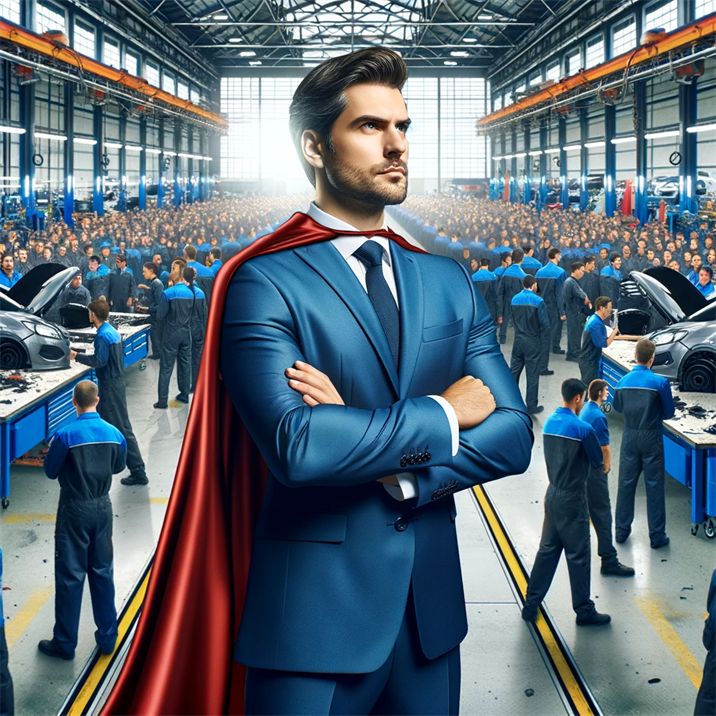Collision Intelligence Blog - February 12, 2024
Steering Success

The Hallmarks of Super-hero Leadership in the 2024 Collision Repair Industry
In 2024, today’s leaders in the collision repair industry are tasked with more than just adept management of business operations. They must excel in navigating the complexities of a highly connected world and meet the evolving demands of a modern workforce. The industry requires superheroes – leaders who can guide both the experienced and the emerging generations forward in this fast-paced sector.
The essence of leadership in the 2024 collision repair industry lies in a unique combination of digital proficiency, understanding the new workforce’s aspirations, a commitment to continuous learning, and the ability to inspire and empower. These leaders, with their strategic vision, ethical standards, and inclusive approach, are not just driving their businesses forward but also shaping a positive future for the entire industry. Businesses must identify and empower these leaders, granting them the “superpowers” needed to guide both current and future generations of the collision workforce forward.
Understanding the Digital Landscape
In a world where information is instantly accessible, leaders in the collision repair industry need to be digitally literate. This means staying current with technological advancements, from AI-powered diagnostic tools to eco-friendly repair techniques. Integrating a broad spectrum of digital information into daily operations is critical. Leaders must filter through the vast digital noise, identify relevant data, and use these insights to foster innovation and operational efficiency.
Adapting to a New Generation of Workforce
The workforce of 2024 is comprised of digital natives who value transparency, flexibility, and purpose in their careers. They seek more than just financial remuneration; they desire work environments that offer personal growth, work-life balance, and a role in contributing to the greater good. Leaders must recognize and nurture these aspirations by cultivating a workplace culture that offers flexible arrangements, continuous learning opportunities, and initiatives that highlight the company’s dedication to social and environmental responsibilities.
Fostering a Culture of Continuous Learning
Rapid changes in the collision repair industry necessitate a mindset of continuous learning, not only for employees but also for leaders. This involves establishing a culture where learning is integrated into daily activities. It includes offering training programs, supporting certifications, and encouraging mentorship. By investing in their team’s development, leaders not only enhance their workforce’s skills but also show commitment to their professional growth, highly valued by today’s generation.
Empowering and Inspiring the Team
Effective leadership extends beyond directing; it involves inspiring and empowering the team. This means delegating responsibilities, nurturing creativity, and acknowledging achievements. In the detail-oriented field of collision repair, enabling employees to take charge of their tasks can lead to greater job satisfaction and higher service quality. Leaders should be approachable and open to feedback, fostering an environment where innovation is encouraged and valued.
Visionary Leadership and Strategic Thinking
Leaders in the collision repair industry need to be visionaries, possessing a clear, strategic vision for the future and the capability to effectively communicate this vision to their team. They should identify emerging trends, anticipate market changes, and navigate their business through potential challenges. Strategic thinking also involves making decisions that balance immediate needs with long-term objectives.
Embracing Diversity and Inclusivity
With the modern workplace becoming increasingly diverse, effective leadership demands an inclusive approach. Leaders should strive to create an environment where diverse perspectives are appreciated and everyone feels included and respected. This enhances team collaboration, fosters creativity, and positively reflects on the company’s brand and reputation.
Ethical Leadership and Social Responsibility
Today’s workforce places high importance on ethics and social responsibility. Leaders should exemplify ethical standards and make decisions considering the broader impact on society and the environment. This could include adopting sustainable practices, engaging in community projects, or ensuring fair labor practices.
Innovating and Adapting in a Changing Industry
Innovation is key in the collision repair industry. Leaders must stay ahead of the curve, adopting new technologies and methods to improve efficiency and customer satisfaction. This includes exploring new materials and techniques, as well as investing in advanced training for staff.
Effective Communication and Team Building
Strong communication skills are essential for leaders. They must effectively convey their vision and goals to the team, ensuring everyone is aligned and moving towards common objectives. Building a strong, cohesive team is crucial for success in this industry.